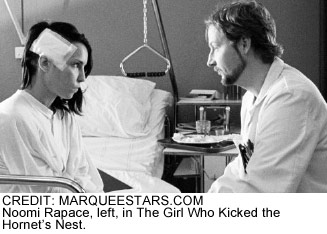Reel Views: The Millennium Trilogy serves up justice for Salander

The Girl Who Kicked the Hornet's Nest (2010)
Since the release of the original Swedish M�n Som Hatar Kvinnor (Men Who Hate Women) in 2005, later renamed The Girl With The Dragon Tattoo, readers and audiences alike have been captivated by the enigmatic, vengeful and perpetual victim Lisbeth Salander in both the series of novels by the late Stieg Larsson and the Swedish films. In the latest film, by Daniel Alfredson, the Swedish trilogy comes to its much-deserved resolution.
The third and final installment of The Millennium Trilogy is The Girl Who Kicked the Hornet's Nest, wherein all conflicts are resolved, and the tragic story of Lisbeth Salander finally takes a peaceful turn. Picking up moments after the violent conclusion of The Girl Who Played with Fire, Lisbeth Salander has been shot in the head, buried alive, and upon digging herself free from her own would-be grave, smashes an axe into her father's head. Lisbeth is recovering nicely in a Swedish hospital with miraculously no residual damage from the bullet in her brain. She is, however, being charged with the attempted murder of her father, the Soviet defector Alexander Zalachenko. The film follows Lisbeth and the fight for her life, her freedom, and her revenge on the men who have treated her poorly her whole life. Hornet's Nest also contains an ingeniously complex and intriguing storyline about a secret government agency who has been continually victimizing Lisbeth in a convoluted Cold War-mongering effort.
The cast from the first two installments of the Swedish films returns to conclude their roles. Noomi Rapace is brilliant as the troubled Salander. The caliber of her acting is frankly one of the best performances of the year. From the excruciatingly violent scenes that Lisbeth must play in her mind again and again to the quiet contemplation of isolation in the hospital and later in her jail cell, Rapace can do it all. Michael Nyqvist continues his role as hardline journalist Mikael Blomkvist, who counts himself among the few friends of Salander. Nyqvist does an impressive job playing a targeted man feverishly trying to both uncover the corrupt government agency while simultaneously proving Salander's innocence. Lena Endre and Annika Hallin also command respect in their roles as empowered women, Erika Berger and Annika Giannini, editor of Millennium Magazine and Lisbeth's lawyer respectively. The performance of Mikael Spreitz as Ronal Neidermann, the blond giant who literally feels no pain, is also worth noting. At the height of his performance in this particular installment of the franchise is his unfortunate run-in with Salander and a nail gun.
At the heart of these films is a message that speaks strongly about the incidents of violence against women in Sweden. It is in the quiet and non-violent conclusion of The Millennium Trilogy that Salander finds justice and is able to move on with her life. For Salander in The Girl Who Kicked the Hornets Nest the story ends in a powerfully satisfying manner.
Rating: 4 1/2 out of 5 stars













